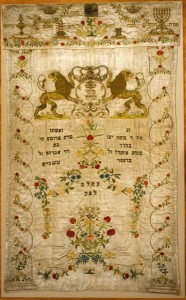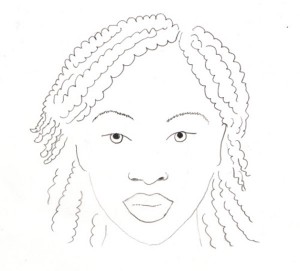On our “Open Day at the Academy,” this Sunday, 27 October 2013, we will celebrate the namesakes of the new public square in front of the Academy on Lindenstrasse: Fromet Mendelssohn, née Gugenheim, and her husband Moses Mendelssohn are now immortalized on Berlin’s cityscape, following much debate and deliberation. Reason enough to find out more about this exceptional couple!

Inspired by deep religious feeling, Fromet and Moses Mendelssohn had Fromet’s wedding dress converted into a Torah curtain. They presented it to Berlin’s Jewish community, where, in the synagogue, it decorated the shrine.
You can find this and other objects relating to Moses Mendelssohn held by the Jewish Museum Berlin in our collections …
In the spring of 1761, when philosopher Moses Mendelssohn met the merchant’s daughter Fromet Gugenheim during a visit to Hamburg, his fate was sealed: he declared his love for her in a garden pavilion, and “stole a few kisses from her lips.” He returned, besotted, to Berlin and wrote to his friend Gotthold Ephraim Lessing:
“I have committed the folly of falling in love in my thirtieth year. The woman I wish to marry has no assets, is neither beautiful nor erudite; yet I am a lovesick beau, so smitten that I believe I could live with her happily ever after.”
The two were wed in June 1762. That they married for love was highly unusual: most marriages at the time were arranged by matchmakers. “[O]ur correspondence can do without ceremony,” Moses assured Fromet on 15 May 1761, in the very first of his letters to his bride: “…our hearts will respond.”
“Before I met you, my love, solitude was my Garden of Eden. But it is intolerable to me now.” Berlin, 24 October 1761 → continue reading
